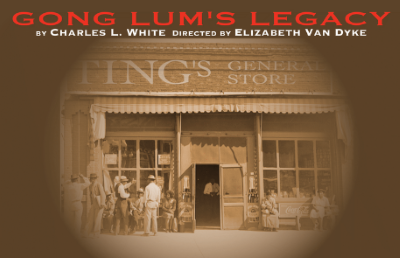GONG WITH THE WIND
In Charles L. White’s new play Gong Lum’s Legacy, currently running at Theatre @ St. Clements in New York City, things happen very quickly. A young Chinese man, a recent immigrant from China, falls in love with a young African American woman within a few minutes of meeting her. However, the same young woman is laser focused on going back to college to finish her degree so she can fulfill her dream of becoming a teacher. The play is set in 1925 and, at that time, being married could jeopardize a woman’s teaching career. Yet she decides to marry the young Chinese man within minutes of him surprising her with an engagement ring after knowing her just a few months. Learning that she will have to go to college eighty miles away, the young man puts up little fight, helps pay for her education and is basically fine with the situation. Also, the young woman comes home from college not pregnant and, in the next scene, is so pregnant that her water breaks and she gives birth. The young man’s father, a very traditional Chinese immigrant who has taken on some racist attitudes towards Black people after years of living in Mississippi, immediately repents his ways after trying to destroy the marriage after the child is born. Oh, and there’s a flood performed by the actors in a kind of dance that was seemingly inspired by the tornado sequence in the Broadway musical The Wiz but not nearly as effective.
Anthony Goss, DeShawn White, Eric Yang, Alinca Hamilton, and Henry Yuk
Mr. White has tapped into a very interesting and seldom explored part of U.S. history, that being the relationship between Chinese immigrants/Chinese Americans and African Americans in the deep south in the mid-nineteen-twenties. Gong Lum’s Legacy takes place in the Mississippi Delta in 1925. It is inspired by a real court case of the time. A Mississippi grocer named Gong Lum sued the state arguing that not allowing his Chinese daughters to attend white schools was discriminatory. The case went all the way to the U.S. Supreme Court where Mr. Lum lost and the discriminatory practices were upheld. The play posits that Mr. Ting in the show is a friend of Mr. Lum though Mr. Lum is never seen in the play. And since the play takes place concurrently with Mr. Lum’s legal battles, it’s not clear how the legacy aspect of the title comes in. However, the play is ultimately a strong indictment of White Supremacist attitudes and an exploration of how those attitudes can be internalized and continued by other races.
Eric Yang and DeShawn White
The main villain in this piece is Charlie Ting, strongly played by Henry Yuk. He is a grocer and runs a store with his son, the newly arrived Joe. The store has a majority Black clientele and some of the discussions of suffering caused by white discrimination to both cultures are eye-opening to hear. Ting becomes a kind of stand in for White Prejudice as he has many rigid and prejudicial attitudes of his own. But he’s not so much a villain as a man trying to survive while caught within the realities of 1925 Mississippi and the demands of his cultural traditions. And herein lies the challenge of Mr. White’s play. While the playwright effectively sets up compelling problems, he doesn’t give them any real depth of exploration and quickly resolves them. This tendency gives a surface and unsatisfying feel to the overall proceedings.
Eric Yang and DeShawn White
Unfortunately, director Elizabeth Van Dyke’s serviceable if uninspired direction does not help. There’s a flat, linear quality to much of the first act, with actors seemingly not allowed to do more than give clear line readings. Also, scene transitions are done in an oddly distracting way and the passage of time is vaguely presented throughout. Two important scenes were especially difficult to focus on – one had other actors unnecessarily siting in another part of the stage, ostensibly in the dark, while the scene took place. Another was almost drowned out by rain/storm sound effects. On that note, David Wright’s sound design consists mostly of storm/rain effects in the second act that all seem to need level checks. While storms and rain play a major part in the show, the actors had to pantomime being in rain, being wet, etc. as there wasn’t even a rain effect on the upstage store window to help them create the storm illusion.
Eric Yang and Henry Yuk
Even with these conditions, the actors did nice work, their talents helping to deepen the cursory nature of the writing. The young lovers Joe Ting and Lucy Sims, earnestly played by Eric Yang and DeShawn White respectively, had a wonderful chemistry together. They believably, if quickly, developed this young couple and we bought their relationship’s struggles and triumphs. These are two very talented actors whose work helped to flesh out what was missing on the page. The very handsome Anthony Goss playing Lucy’s brother Melvin, and the very funny Alinca Hamilton playing Lucy’s good friend Loretta, both gave ample support – providing well-rounded characters that supplied the show with some of its more light-hearted and poignant moments.
Henry Yuk and Anthony Goss
Gong Lum’s Legacy needs further development but has the seeds to be a very good play. Mr. White is a talented writer and has a good ear for authentic sounding dialogue. Perhaps allowing the characters more time to really struggle with the problems he’s dramatized may be a useful start. That may change the play to some extent but may also create a much more satisfying plunge into this story’s very compelling yet rarely explored topic.
Gong Lum’s Legacy
Woodie King Jr.’s New Federal Theatre
in association with The Peccadillo Theater Company
Theatre @ St. Clements, 423 West 46th Street
ends on April 24, 2022
for tickets ($39; $20 students/seniors), visit New Federal

